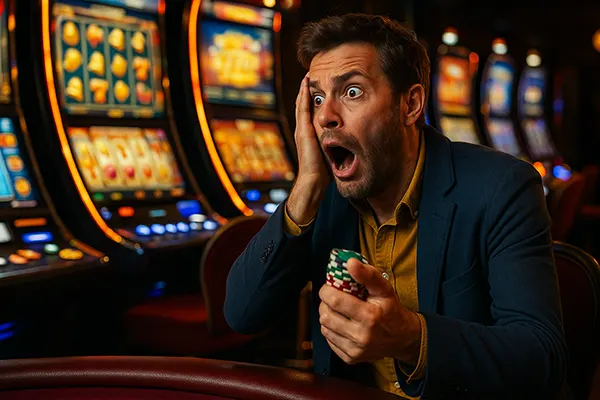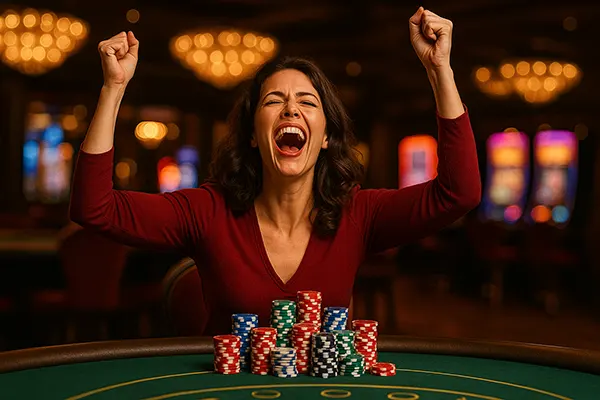
The Victory Paradox: Why Big Wins Often Lead to Losses
Winning in gambling evokes euphoria, excitement, and the illusion of control. For many, that rare moment of hitting a jackpot feels like proof of skill rather than luck. Yet psychological and neurological studies reveal a paradox — the more significant the win, the greater the risk of future losses. This phenomenon, known as the “victory paradox,” illustrates how the brain’s chemistry and human behaviour can turn a triumph into the beginning of decline.
The Dopamine Rush: When Winning Becomes Addictive
A win triggers a surge of dopamine — a neurotransmitter responsible for feelings of pleasure and reward. This chemical reaction creates a powerful sense of satisfaction and encourages the player to repeat the behaviour that led to that feeling. Scientists compare it to the reaction caused by substances like sugar or even narcotics — the brain craves another hit of the same euphoria.
However, the problem lies in how dopamine works. After a massive release, the brain’s receptors become less sensitive, requiring higher levels of stimulation to achieve the same feeling. That’s why, after one major win, gamblers often chase another — believing the next round will bring back the same high. This is the moment when logical decision-making begins to fade.
Instead of walking away with profits, many players reinvest their winnings in pursuit of the same excitement. The focus shifts from rational play to emotional impulse, driven not by the desire for money but by the need to relive the rush of victory.
The Illusion of Control and False Confidence
After a big win, players often believe they have mastered the game. Psychologists call this the “illusion of control” — a cognitive bias that makes people think they can influence outcomes governed purely by chance. When success happens once, the mind begins to attribute it to personal skill rather than luck, which leads to overconfidence.
This illusion distorts perception. A player who previously followed a budget or set limits begins to ignore them, convinced that their “winning strategy” will continue to work. As a result, they increase bet sizes, play longer, and expose themselves to higher risks, believing luck is still on their side.
In reality, the probability of losing remains unchanged. Each new spin or deal is independent of the previous one. Yet the illusion of control can turn rational players into reckless risk-takers, pushing them further into loss cycles that feel impossible to escape.
The Psychology of the Unfinished Cycle
Another key factor that drives continuous play after a big win is the psychological concept of the “unfinished cycle.” The brain tends to fixate on incomplete experiences, seeking closure. In gambling, the win does not provide closure — it opens a new emotional loop. The mind keeps searching for the next climax, the next confirmation of success.
Even after significant profit, players often feel a sense of incompleteness. The satisfaction fades quickly, replaced by curiosity: “Can I do it again?” This state keeps the cycle alive — win, chase, lose, repeat. In behavioural psychology, this mechanism explains why slot players, for instance, continue playing even when they are already ahead.
What begins as excitement transforms into compulsion. Instead of ending the game at a high point, many gamblers unconsciously seek to “complete the story” — a story that rarely ends with another victory.
The Role of Cognitive Dissonance
When a player starts losing after a big win, cognitive dissonance emerges — the psychological discomfort from holding two conflicting beliefs: “I am lucky” and “I am losing.” To resolve this tension, the gambler may continue playing, convinced that the next round will restore balance.
This mechanism explains why some individuals double down on their bets after setbacks. It’s not pure greed; it’s an attempt to make reality match the positive self-image created by the initial win. Unfortunately, this mental trap often leads to deeper losses and emotional exhaustion.
The only effective way to break the cycle is awareness. Recognising that luck has no memory and that dopamine is driving the urge to play can help players regain control and adopt responsible gambling practices.

Recovering from the Victory Paradox
Overcoming the victory paradox requires more than willpower — it demands an understanding of human behaviour. Successful gamblers and psychologists alike stress the importance of preparation and emotional regulation. Setting clear limits before play and sticking to them, regardless of outcome, helps separate logic from emotion.
Awareness of dopamine’s effects is also vital. By recognising that pleasure from winning is temporary and chemically induced, players can treat gambling as entertainment rather than a path to financial gain. This mindset transforms risk-taking into controlled leisure rather than self-destructive obsession.
Finally, acknowledging losses without emotional attachment allows the mind to complete the “unfinished cycle.” Players who accept that every win or loss is part of a random process develop resilience and long-term balance. Gambling then becomes what it should have always been — a form of amusement, not a measure of self-worth.
Responsible Gambling and Mental Balance
In 2025, most reputable casinos and betting operators actively promote responsible gambling programmes. These include self-exclusion tools, betting limits, and partnerships with mental health organisations. Such measures reflect a growing understanding that gambling addiction is not a lack of discipline but a neurological and psychological condition.
Modern players also have access to education and self-assessment resources that help recognise early signs of compulsive play. Awareness campaigns encourage gamblers to take breaks, set realistic expectations, and seek professional help when necessary.
Ultimately, breaking free from the victory paradox means learning to enjoy the game without letting emotions dictate actions. True mastery lies not in constant winning, but in knowing when to stop.
